- Home
- V. S. Naipaul
The Mystic Masseur
The Mystic Masseur Read online
V. S. NAIPAUL
The Mystic Masseur
V. S. Naipaul was born in Trinidad in 1932. He went to England on a scholarship in 1950. After four years at Oxford he began to write, and since then he has followed no other profession. He is the author of more than twenty books of fiction and nonfiction and the recipient of numerous honors, including the Nobel Prize in 2001, the Booker Prize in 1971 and a knighthood for services to literature in 1990. He lives in Wiltshire, England.
Also by V. S. Naipaul
NONFICTION
Between Father and Son: Family Letters
Beyond Belief: Islamic Excursions Among the Converted Peoples
India: A Million Mutinies Now
A Turn in the South
Finding the Center
Among the Believers
The Return of Eva Perón (with The Killings in Trinidad)
India: A Wounded Civilization
The Overcrowded Barracoon
The Loss of El Dorado
An Area of Darkness
The Middle Passage
FICTION
Half a Life
A Way in the World
The Enigma of Arrival
A Bend in the River
Guerrillas
In a Free State
A Flag on the Island
Mr. Stone and the Knights Companion
A House for Mr. Biswas
Miguel Street
The Suffrage of Elvira
FIRST VINTAGE INTERNATIONAL EDITION, JANUARY 2002
Copyright © 1957, copyright renewed 1985 by V. S. Naipaul
All rights reserved under International and Pan-American Copyright Conventions. Published in the United States by Vintage Books, a division of Random House, Inc., New York. Originally published in hardcover in Great Britain by Andre Deutsch Limited, London, in 1957. First published in hardcover in the United States by The Vanguard Press, Inc., a division of Random House, Inc., New York, in 1959.
Vintage is a registered trademark and Vintage International and colophon are trademarks of Random House, Inc.
Library of Congress Cataloging-in-Publication Data
Naipaul, V. S. (Vidiadhar Surajprasad), 1932–
The mystic masseur / V. S. Naipaul.
p. cm.
eISBN: 978-0-307-77651-8
1. Trinidad and Tobago—Fiction. 2. Mystics—Fiction. I. Title.
PR9272.9.N32 M9 2002
823′. 914—dc21
2001040849
www.vintagebooks.com
v3.1
To the Memory of my Father
and for Gordon Woolford
Contents
Cover
About the Author
Other Books by This Author
Title Page
Copyright
Dedication
Chapter 1. The Struggling Masseur
Chapter 2. Pupil and Teacher
Chapter 3. Leela
Chapter 4. The Quarrel with Ramlogan
Chapter 5. Trials
Chapter 6. The First Book
Chapter 7. The Mystic Masseur
Chapter 8. More Trouble with Ramlogan
Chapter 9. Press Pundit
Chapter 10. The Defeat of Narayan
Chapter 11. M.L.C.
Chapter 12. M.L.C. to M.B.E.
Epilogue A Statesman on the 12.57
All characters, organizations, and incidents in this novel are fictitious. This is a necessary assurance because, although its politicians have taken to calling it a country, Trinidad is a small island, no bigger than Lancashire, with a population somewhat smaller than Nottingham’s. In this novel the geography of the island is distorted. Dates are, unavoidably, mentioned; but no actual holder of any office is portrayed. The strike mentioned in Chapter Twelve has no basis in fact.
1. The Struggling Masseur
LATER HE WAS TO BE famous and honoured throughout the South Caribbean; he was to be a hero of the people and, after that, a British representative at Lake Success. But when I first met him he was still a struggling masseur, at a time when masseurs were ten a penny in Trinidad.
This was just at the beginning of the war, when I was still at school. I had been bullied into playing football, and in my first game I had been kicked hard on the shin and laid up for weeks afterwards.
My mother distrusted doctors and never took me to one. I am not blaming her for this because in those days people went by preference to the unqualified masseur or the quack dentist.
‘I know the sort of doctors it have in Trinidad,’ my mother used to say. ‘They think nothing of killing two three people before breakfast.’
This wasn’t as bad as it sounds: in Trinidad the midday meal is called breakfast.
My foot was hot and swollen, and getting more and more painful. ‘So what we going to do?’ I asked.
‘Do?’ my mother said. ‘Do? Give the foot a little more time. You never know what could happen.’
I said, ‘I know what going to happen. I going lose the whole damn foot, and you know how these Trinidad doctors like cutting off black people foot.’
My mother grew a little worried and she made a large mud-plaster for the foot that evening.
Two days later she said, ‘It looking a little serious. Is only Ganesh now for you, boy.’
‘Who the hell is this Ganesh?’
This was a question many people were going to ask later on.
‘Who is this Ganesh?’ my mother mocked. ‘This Ganesh? You see the sort of education they giving you children these days. Your foot break up and hurting, and still you talking about this man as though you is his father when the man old enough to be your father.’
I said, ‘What he does do?’
‘Oh, he does cure people.’
She spoke in a guarded way and I felt that she didn’t want to talk too much about Ganesh because his gift of healing was a holy thing.
It was a long drive to Ganesh’s, more than two hours. He lived in a place called Fuente Grove, not far from Princes Town. Fuente Grove – Fountain Grove – seemed a curious name. There was no hint of a fountain anywhere, no hint even of water. For miles around the land was flat, treeless, and hot. You drove through miles and miles of sugar-cane; then the sugar-cane stopped abruptly to make room for Fuente Grove. It was a sad little village, just a dozen or so thatched huts strung out on the edge of the narrow lumpy road. Beharry’s shop was the one sign of a social life and we stopped outside it. It was a wooden building, dingy distemper flaking off the walls and the corrugated-iron roof warped and rusted. A little notice said that Beharry was licensed to sell spirituous liquors, and I could see the man so privileged – as I thought – sitting on a stool in front of the counter. Spectacles rested on the tip of his nose and he was reading the Trinidad Sentinel at arm’s length.
Our taxi-driver shouted, ‘Ai!’
The paper was lowered. ‘Oi! I is Beharry.’ He slid off the stool and began rubbing the palms of his hands over his little belly. ‘Is the pundit you looking for, not so?’
The taxi-driver said, ‘Nah. We come all the way from Port of Spain just for the scenery.’
Beharry was not prepared for this incivility. He stopped rubbing his belly and started to tuck his vest into his khaki trousers. A big woman appeared behind the counter and when she saw us she pulled her veil over her head.
‘These people want to find out something,’ Beharry told her, and went behind the counter.
The woman shouted, ‘Who you looking for?’
My mother replied, ‘The pundit we looking for.’
‘Just go down the road a little bit,’ the woman said. ‘You can’t miss the house. It have a mango tree in the yard.’
The woman was right. We couldn’t miss Ganesh�
�s house. It had the only tree in the village and it looked a little better than most of the huts.
The driver honked the horn and a woman appeared from behind the house. She was a young woman, big-boned but thin, and she was trying to give us some attention and shoo away some fowls with a cocoye broom at the same time. She examined us for a while and then began shouting, ‘Man! Eh, manwa!’
Then she looked hard at us again and pulled her veil over her head.
She shouted again, ‘Eh, eh, you ain’t hear me calling you? Man! Eh, manwa!’
A high voice came fluting out of the house. ‘Yes, man.’
The driver turned off the engine and we heard sounds of shuffling inside the house.
Presently a young man came out on the small verandah. He was dressed in the ordinary way, trousers and vest, and I didn’t think he looked particularly holy. He wasn’t wearing the dhoti and koortah and turban I had expected. I was a little reassured when I saw that he was holding a big book. To look at us he had to shelter his eyes from the glare with his free hand, and as soon as he saw us he ran down the wooden steps and across the yard and said to my mother, ‘Is nice to see you. How is everything these days?’
The taxi-driver, now curiously correct, was staring at the heat waves jigging up from the black road, and chewing on a matchstick.
Ganesh saw me and said, ‘Ooh, ooh, something happen to the boy.’ And he made a few sad noises.
My mother got out of the car, straightened her dress, and said, ‘You know, Baba, how children getting out of hand these days. Look at this boy.’
All three of them, Ganesh, my mother, and the taxi-driver, looked at me.
I said, ‘But what happen that all you people looking at me so for? I kill priest?’
‘Look at this boy,’ my mother said. ‘You think he make for any rough game?’
Ganesh and the taxi-driver shook their heads.
‘Eh, eh,’ my mother continued, ‘look at my crosses one day. I see the boy coming home limping. I say, “What happen that you limping, boy?” He answer me back brave brave like a man, “I was playing football.” I say, “Playing the fool, you mean.” ’
Ganesh said to the taxi-driver, ‘Help me take the boy inside the house.’
As they carried me in I noticed that someone had tried to scratch a little garden into the hard and dusty front yard, but nothing remained now except the bottle-borders and a few tough stumps of hibiscus.
Ganesh looked the only cool thing in the village. His eyes were deep black, his skin was yellowish, and he was just a little flabby.
But nothing had prepared me for what I was to see inside Ganesh’s hut. As soon as we entered my mother winked at me, and I could see that even the taxi-driver was fighting to control his astonishment. There were books, books, here, there, and everywhere; books piled crazily on the table, books rising in mounds in the corners, books covering the floor. I had never before seen so many books in one place.
‘How much books it have here, pundit?’ I asked.
‘I never really count them,’ Ganesh said, and called, ‘Leela!’
The woman with the cocoye broom came so quickly I fancied she was waiting to be called.
‘Leela,’ Ganesh said, ‘the boy want to know how much book it have here.’
‘Let me see,’ Leela said, and hitched up the broom to her waistband. She started to count off the fingers of her left hand. ‘Four hundred Everyman, two hundred Penguin – six hundred. Six hundred, and one hundred Reader’s Library, make seven hundred. I think with all the other book it have about fifteen hundred good book here.’
The taxi-driver whistled, and Ganesh smiled.
‘They is all yours, pundit?’ I asked.
‘Is my only vice,’ Ganesh said. ‘Only vice. I don’t smoke. I don’t drink. But I must have my books. And, mark you, every week I going to San Fernando to buy more, you know. How much book I buy last week, Leela?’
‘Only three, man,’ she said. ‘But they was big books, big big books. Six to seven inches altogether.’
‘Seven inches,’ Ganesh said.
‘Yes, seven inches,’ Leela said.
I supposed Leela was Ganesh’s wife because she went on to say, with mock irritation, ‘That is all he good for. You know how much I does tell him not to read all the time. But you can’t stop him from reading. Night and day he reading.’
Ganesh gave a short laugh and signalled to Leela and the taxi-driver to leave the room. He made me lie down on a blanket on the floor and began feeling my leg all over. My mother remained in a corner, watching. From time to time Ganesh thumped my foot and I gave a great yelp of pain and he said, ‘Ummh,’ very thoughtfully.
I tried to forget Ganesh thumping my leg about and concentrated on the walls. They were covered with religious quotations, in Hindi and English, and with Hindu religious pictures. My gaze settled on a beautiful four-armed god standing in an open lotus.
When Ganesh had done examining me, he rose and said, ‘Nothing wrong with the boy at all, maharajin. Nothing at all. Is the trouble with so much people who does come to me. Nothing really wrong with them. The only thing I could say about the boy is that he have a little bad blood. That is all. It have nothing I could do.’
And he began mumbling a Hindi couplet over me while I lay on the floor. If I had been sharper I would have paid more attention to that, for it showed, I am convinced, the incipient mystical leanings of the man.
My mother came and looked down at me and asked Ganesh in a barely querulous way, ‘You sure nothing wrong with the boy? The foot look very bad to me.’
Ganesh said, ‘Don’t worry. I giving you something here that will get the boy foot better in two two’s. Is a little mixture I make up myself. Give it to the boy three times a day.’
‘Before or after meals?’ my mother asked.
‘Never after!’ Ganesh warned.
My mother was satisfied.
‘And,’ Ganesh added, ‘you can mix a little bit with the boy food. You never know what good could come of that.’
After seeing all those books in Ganesh’s hut I was ready to believe in him and quite prepared to take his mixture. And I respected him even more when he gave my mother a little booklet, saying, ‘Take it. I giving it to you free although it cost me a lot to write it and print it.’
I said, ‘Is really you who write this book, pundit?’
He smiled and nodded.
As we drove away I said, ‘You know, Ma, I really wish I did read all those books Ganesh Pundit have in his house.’
It was hurtful and surprising, therefore, when two weeks later my mother said, ‘You know, I have a good mind to leave you alone and let you get better by yourself. If you did only go with a good mind to see Ganesh, you woulda be better and walking about by now.’
In the end I went to a doctor in St Vincent Street who took one look at my foot, said, ‘Abscess. Will have to cut it.’ And charged ten dollars.
I never read Ganesh’s booklet, 101 Questions and Answers on the Hindu Religion; and although I had to take his terrible mixture three times a day (I refused to have it in my food), I held no ill-will towards him. On the contrary, I often thought with a good deal of puzzled interest about the little man locked away with all those fifteen hundred books in the hot and dull village of Fuente Grove.
‘Trinidad full of crazy people,’ I said.
‘Say that if it make you happy,’ my mother snapped back. ‘But Ganesh ain’t the fool you think he is. He is the sorta man who woulda be a rishi in India. The day go come when you go be proud to tell people that you did know Ganesh. Now shut your mouth up so that I could dress the foot for you.’
Less than a year later Trinidad woke up to find page three of the Trinidad Sentinel carrying a column advertisement with a photograph of Ganesh and the caption:
Interested people were urged to reply to Fuente Grove for a free, illustrated folder giving full particulars.
I don’t imagine many people wrote in for further information ab
out Ganesh. We were used to advertisements like that, and Ganesh’s caused little comment. None of us foresaw that advertisement’s astounding consequences. It was only later on, when Ganesh had won the fame and fortune he deserved so well, that people remembered it. Just as I have.
Nineteen forty-six was the turning-point of Ganesh’s career; and, as if to underline the fact, in that year he published his autobiography, The Years of Guilt (Ganesh Publishing Co. Ltd, Port of Spain. $2.40). The book, variously described as a spiritual thriller and a metaphysical whodunit, had a considerable success of esteem in Central America and the Caribbean. Ganesh, however, confessed that the autobiography was a mistake. So, in the very year of publication it was suppressed and the Ganesh Publishing Company itself wound up. The wider world has not learnt of Ganesh’s early struggles, and Trinidad resents this. I myself believe that the history of Ganesh is, in a way, the history of our times; and there may be people who will welcome this imperfect account of the man Ganesh Ramsumair, masseur, mystic, and, since 1953, M.B.E.
2. Pupil and Teacher
GANESH WAS NEVER really happy during the four years he spent at the Queen’s Royal College. He went there when he was nearly fifteen and he was not as advanced as the other boys of his own age. He was always the oldest boy in his class, with some boys three or even four years younger than himself. But he was lucky to go to the college at all. It was by the purest chance that his father got the money to send him there. For years the old man had held on to five acres of waste land near Fourways in the hope that the oil companies would sink a well in it, but he could not afford to bribe the drillers and in the end he had to be content with a boundary well. It was disappointing and unfair, but opportune; and the royalties were enough to keep Ganesh in Port of Spain.
Mr Ramsumair made a lot of noise about sending his son to the ‘town college’, and the week before the term began he took Ganesh all over the district, showing him off to friends and acquaintances. He had Ganesh dressed in a khaki suit and a khaki toupee and many people said the boy looked like a little sahib. The women cried a little and begged Ganesh to remember his dead mother and be good to his father. The men begged him to study hard and help other people with his learning.

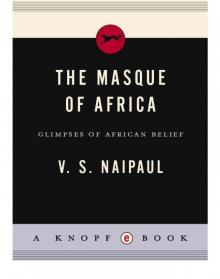 The Masque of Africa: Glimpses of African Belief
The Masque of Africa: Glimpses of African Belief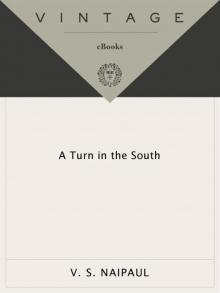 A Turn in the South
A Turn in the South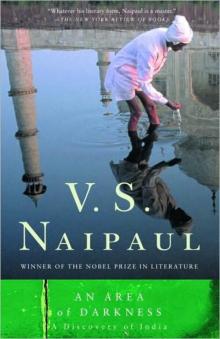 An Area of Darkness
An Area of Darkness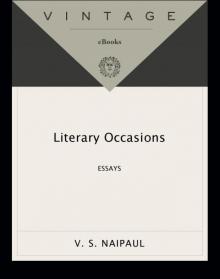 Literary Occasions: Essays
Literary Occasions: Essays A Way in the World
A Way in the World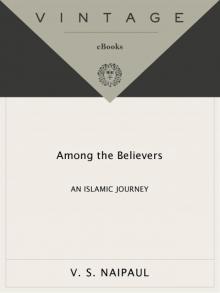 Among the Believers: An Islamic Journey
Among the Believers: An Islamic Journey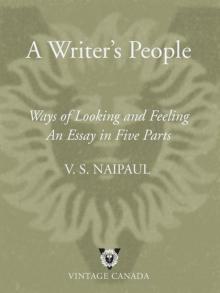 A Writer's People: Ways of Looking and Feeling
A Writer's People: Ways of Looking and Feeling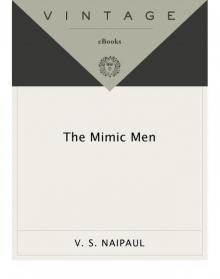 The Mimic Men: A Novel
The Mimic Men: A Novel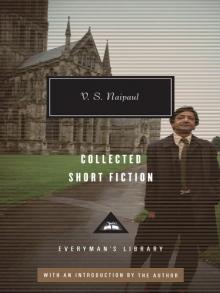 Collected Short Fiction
Collected Short Fiction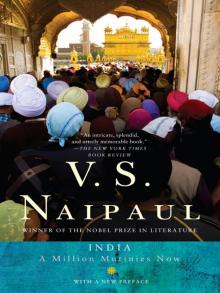 India: A Million Mutinies Now
India: A Million Mutinies Now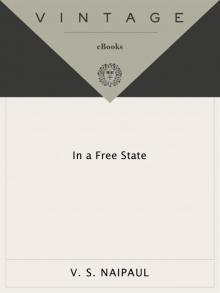 In a Free State
In a Free State Half a Life
Half a Life Beyond Belief: Islamic Excursions Among the Converted Peoples
Beyond Belief: Islamic Excursions Among the Converted Peoples Guerrillas
Guerrillas A House for Mr. Biswas
A House for Mr. Biswas The Writer and the World: Essays
The Writer and the World: Essays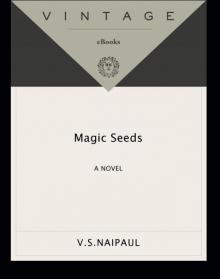 Magic Seeds
Magic Seeds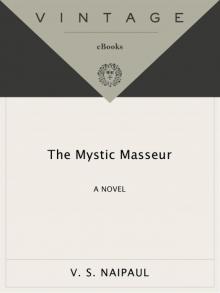 The Mystic Masseur
The Mystic Masseur Miguel Street
Miguel Street The Return of Eva Perón, With the Killings in Trinidad
The Return of Eva Perón, With the Killings in Trinidad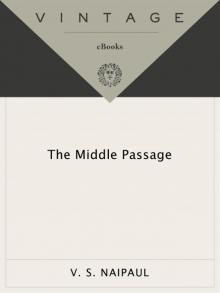 The Middle Passage
The Middle Passage A Bend in the River
A Bend in the River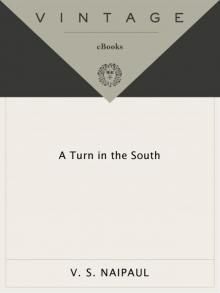 A Turn in the South (Vintage International)
A Turn in the South (Vintage International)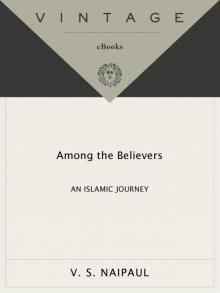 Among the Believers
Among the Believers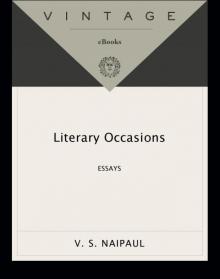 Literary Occasions
Literary Occasions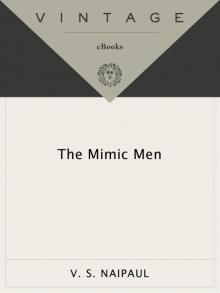 The Mimic Men
The Mimic Men The Writer and the World
The Writer and the World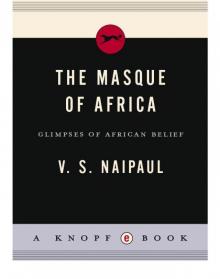 The Masque of Africa
The Masque of Africa